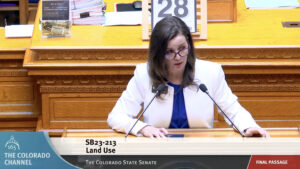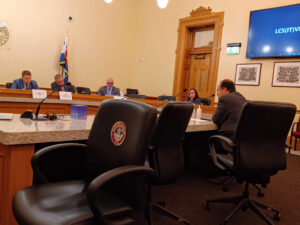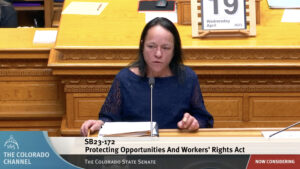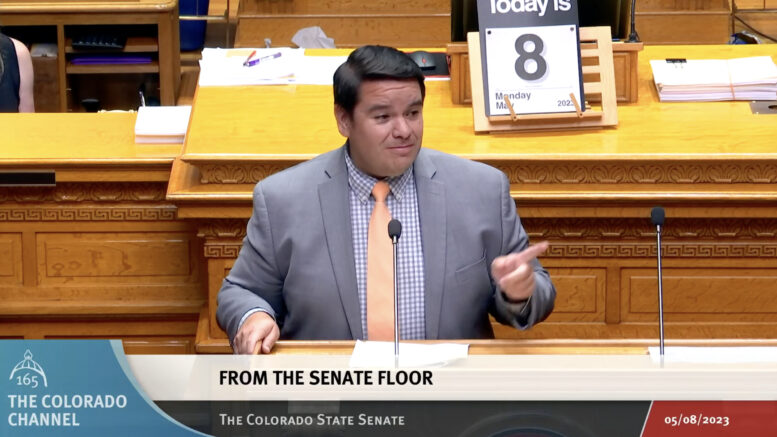Colorado Senate Majority Leader Dominick Moreno is leaving the Legislature to become a high-ranking official in new Denver Mayor Mike Johnston’s administration, and his exit leaves questions about how the upper chamber will function in 2024.
Moreno, D-Commerce City, has been the behind-the-scenes architect of Senate functions since he took over as its No. 2 official midway through the 2022 session, after then-President Leroy Garcia resigned and then-Majority Leader Steve Fenberg rose to become president. Known for being both a policy wonk and an organizational leader, he worked together with Fenberg to try to address significant issues while also offering compromises to minority-party members.
Though Moreno was never known as a business advocate, he was open to business input and worked to include it even in his policies that business organizations opposed.
Moreno’s business record
Over the course of the 2020 and 2021 sessions, for example, he and cosponsoring Sen. Chris Hansen, D-Denver, recrafted a proposal that originally sought wide-ranging cuts to business tax exemptions into one with more targeted tax-break rollbacks that also expanded the number of small companies that are exempt from paying any business personal property taxes. He also helped to negotiate changes to an air-quality-permitting bill this year that transformed it from a regulation-heavy set of mandates into a measure that created a soon-to-meet interim legislative committee to study ozone-quality solutions.
Moreno’s negotiating skills didn’t always leave business groups happy. He was a sponsor of a 2019 law, for example, that let cities and counties raise their minimum-wage levels above those of the state, which businesses warned would create problems both for companies operating in multiple cities and for firms competing for entry-level talent.
And sometimes Moreno couldn’t bring about the consensus that he often sought to create. This past session, he sponsored the seismic bill that would have overridden local control to allow for construction of more multifamily housing in cities statewide – a bill that died under immense opposition from municipal leaders and a House/Senate rift over how far it should go.

Colorado Senate Majority Leader Dominick Moreno speaks at a March news conference announcing a package of housing-reform bills.
“Thoughtful and balanced leadership”
But over four years in the House and seven in the Senate, Moreno became a major arbiter of policy at the Capitol, serving both as chairman of the powerful Joint Budget Committee and as Senate majority leader at a time of overwhelming Democratic margin.
“We truly appreciate the leadership and commitment Senator Moreno has given to the General Assembly for many years and his collaboration with the Colorado Chamber and the entire business community,” Colorado Chamber of Commerce President/CEO Loren Furman said Friday. “We will miss his thoughtful and balanced leadership style and wish him great success in his new role.”
That new role will be as the deputy chief of staff for strategy for Johnston — a former state senator who didn’t overlap with Moreno in that chamber but worked with him as a House member. Fenberg lauded Johnston’s move in hiring Moreno, saying in a news release that Moreno’s “ability to cut through the noise, have tough conversations, forge compromise and find solutions to our toughest challenges is unparalleled.”
The battle to be Senate majority leader
Moreno’s decision immediately set off a scramble among Senate Democrats to become the next majority leader, with one senator saying in an interview that he’d been on the phone with people seeking his support throughout the day. Three senators of decidedly different ideological leanings appear to be the most interested in the role: Robert Rodriguez, Faith Winter and Rachel Zenzinger.

Colorado state Sen. Rachel Zenzinger speaks about Moreno’s land-use bill, for which she was the primary author of major changes, earlier this year.
Zenzinger, who confirmed her interest to The Sum & Substance, ran for majority leader in 2018 after the Democrats won back the Senate but lost to Fenberg, putting her on a pathway instead that’s led her to be chairwoman of the six-member budget-writing JBC. The Arvada resident is arguably the most pro-business member of her caucus, and her moderate stances on areas from regulation to home rule sometimes have resulted in clashes with her party, but she carries significant weight with moderates who flexed their muscle often during this past session.

Colorado state Sen. Robert Rodriguez discusses his bill on gig-worker transparency with the Senate Finance Committee in May.
Rodriguez, the assistant majority leader, is a labor advocate who’s sought changes to workers’ compensation law and gig-worker regulation, but he’s also been a swing vote who helped kill a bill this year to give unemployment-insurance payments to beneficiaries’ dependents. He’s a Denver resident who just started his second term this year.
Election’s far-reaching impacts

Colorado state Sen. Faith Winter speaks on the Senate floor for the POWR Act that she co-sponsored.
Winter is one of the staunchest environmental and workers-rights advocates in the Senate, and her bills — including the 2023 air-quality-permitting bill and the POWR Act that expanded the definition of sexual harassment — often spark business opposition. She pulls significant support from the more progressive wing of the caucus and confirmed to Colorado Politics that she intends to seek the position.
The election of the next majority leader will have implications beyond just the 2024 session. With Fenberg barred from term limits from seeking another term following next year, the election of Rodriguez or Winter as the No. 2 leader in the chamber could put them in the driver’s seat to replace him, though Zenzinger also is term-limited after next session.
Meanwhile, state Rep. Dafna Michaelson Jenet, a Commerce City Democrat who already had filed to run for Moreno’s seat next year when he was to be term-limited, emerged as the frontrunner to replace him when a vacancy committee selects someone to fill the seat. Known as an advocate for behavioral health and for children’s rights, Jenet said in a news release Friday that she also would like to “expand (Colorado’s) renewable energy infrastructure to help fight climate change.”
